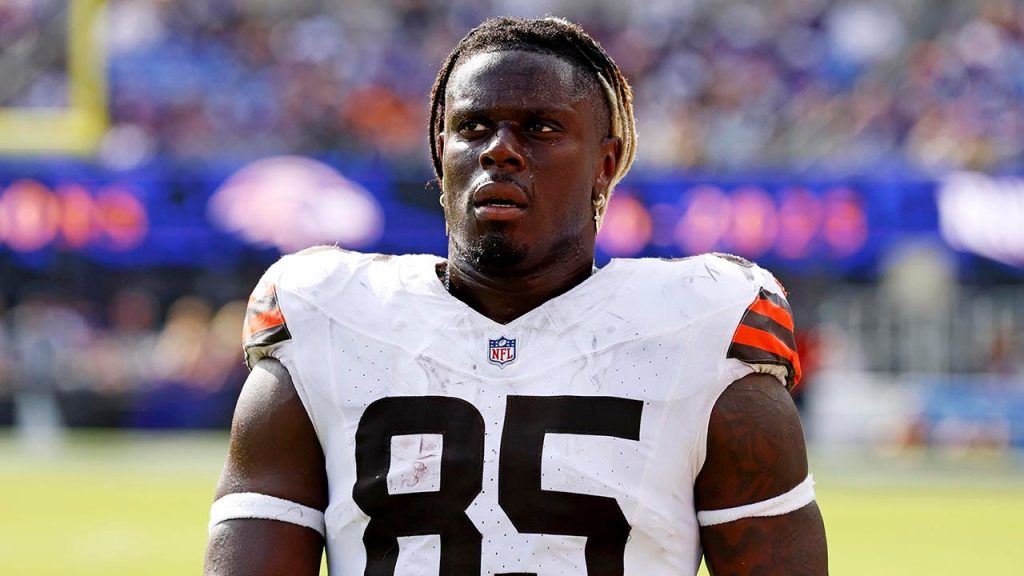David Njoku’s Unwavering Loyalty to the Cleveland Browns
Despite the Cleveland Browns’ challenging season and their 2-6 record, veteran tight end David Njoku made it abundantly clear he has no desire to leave the team that drafted him 29th overall in 2017. When reporters questioned his reaction to not being traded before Tuesday’s NFL trade deadline, Njoku responded with passionate conviction: “Of course, it’s always a possibility. This is the NFL. But I’m in Cleveland, baby. I’m not going nowhere. I ain’t f—ing leaving.” His emotional response continued as reporters pressed the issue, with Njoku emphatically stating “Jesus Christ, no” when asked if he’d ever consider departing from the franchise. This display of loyalty stands out in today’s NFL, where player movement has become increasingly common.
Njoku’s dedication to Cleveland is particularly noteworthy considering the team’s struggles during his tenure. Since he entered the league in 2017, the Browns have compiled a disappointing 55-84-1 record and made just one playoff appearance. While many players in similar situations might seek greener pastures with more competitive teams, Njoku has embraced his role as one of the team’s leaders both on and off the field. His commitment runs deeper than just professional obligation; there’s a genuine affection for the city and organization that has been his home for nearly a decade. When asked why he feels so strongly about remaining with the Browns, he proudly displayed his custom jewelry featuring his number 85 alongside both the Nigerian flag and the state of Ohio—a physical representation of how deeply his identity has become intertwined with the franchise.
Trade speculation around Njoku was primarily fueled by his contract situation, as the 29-year-old tight end is set to become an unrestricted free agent after this season. Many teams looking for offensive weapons typically target players in the final year of their contracts, making Njoku an attractive option for contenders. When asked whether extension talks had begun with the Browns, Njoku offered a knowing smile and said, “I can’t say,” suggesting that behind-the-scenes conversations might already be underway. His response indicates a mutual interest in continuing the relationship beyond this season, though nothing has been officially announced by either party.
The emergence of rookie tight end Harold Fannin Jr., who has accumulated impressive stats with 38 catches for 352 yards and two touchdowns this season, further intensified trade rumors surrounding Njoku. Many analysts speculated that Fannin’s development might make the veteran expendable, providing the struggling Browns an opportunity to acquire future draft capital by moving Njoku to a contender. However, the organization ultimately decided to retain both tight ends, potentially envisioning a potent two-tight end system moving forward. Njoku himself has remained productive despite the team’s offensive struggles, recording 27 receptions for 260 yards and two touchdowns through seven games this season.
When the trade deadline passed without his name being called, Njoku expressed nothing but relief and happiness. “I’m so happy, man. I don’t know how else to put it — I’m so happy. I’m serious,” he told reporters. This reaction stands in stark contrast to many veterans on struggling teams who often view trades as opportunities for fresh starts with playoff contenders. Njoku’s response reflects a player who genuinely values stability, community connection, and organizational loyalty over the allure of joining a team with better immediate championship prospects. His attitude represents an increasingly rare perspective in professional sports, where player movement and pursuing championships often take precedence over team loyalty.
As the Browns navigate the remainder of what appears to be another difficult season, Njoku’s presence provides both on-field production and valuable leadership. The New Jersey native will finish out the season with Cleveland, but his long-term future remains uncertain pending contract negotiations. What is clear, however, is Njoku’s desire to remain with the Browns for the duration of his career—a sentiment that resonates deeply with the loyal Cleveland fanbase that has endured decades of football disappointment. In a sports era where player movement is constant and loyalty often seems conditional, Njoku’s unwavering commitment to the Browns organization offers a refreshing reminder that for some athletes, the connection to a team, city, and fanbase transcends win-loss records and championship aspirations.


